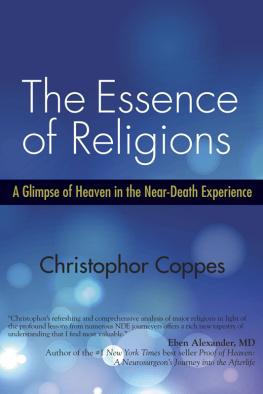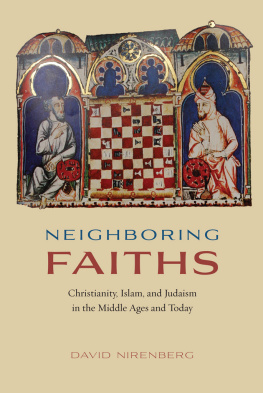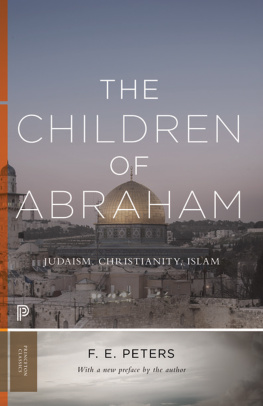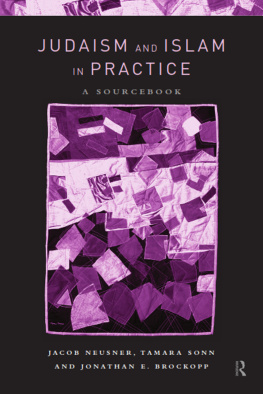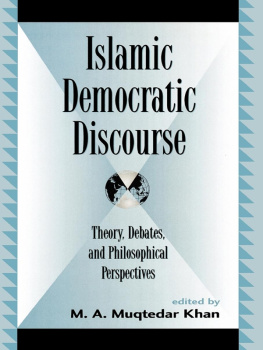Sonn Tamara - Comparing religions through law: Judaism and Islam
Here you can read online Sonn Tamara - Comparing religions through law: Judaism and Islam full text of the book (entire story) in english for free. Download pdf and epub, get meaning, cover and reviews about this ebook. City: London;New York, year: 2010;2011, publisher: Routledge, genre: Religion. Description of the work, (preface) as well as reviews are available. Best literature library LitArk.com created for fans of good reading and offers a wide selection of genres:
Romance novel
Science fiction
Adventure
Detective
Science
History
Home and family
Prose
Art
Politics
Computer
Non-fiction
Religion
Business
Children
Humor
Choose a favorite category and find really read worthwhile books. Enjoy immersion in the world of imagination, feel the emotions of the characters or learn something new for yourself, make an fascinating discovery.
- Book:Comparing religions through law: Judaism and Islam
- Author:
- Publisher:Routledge
- Genre:
- Year:2010;2011
- City:London;New York
- Rating:5 / 5
- Favourites:Add to favourites
- Your mark:
- 100
- 1
- 2
- 3
- 4
- 5
Comparing religions through law: Judaism and Islam: summary, description and annotation
We offer to read an annotation, description, summary or preface (depends on what the author of the book "Comparing religions through law: Judaism and Islam" wrote himself). If you haven't found the necessary information about the book — write in the comments, we will try to find it.
Sonn Tamara: author's other books
Who wrote Comparing religions through law: Judaism and Islam? Find out the surname, the name of the author of the book and a list of all author's works by series.
Comparing religions through law: Judaism and Islam — read online for free the complete book (whole text) full work
Below is the text of the book, divided by pages. System saving the place of the last page read, allows you to conveniently read the book "Comparing religions through law: Judaism and Islam" online for free, without having to search again every time where you left off. Put a bookmark, and you can go to the page where you finished reading at any time.
Font size:
Interval:
Bookmark:

COMPARING RELIGIONS THROUGH LAW
Comparing Religions Through Law: Judaism and Islam offers a ground-breaking study which compares the two religions through shared dominant structures. In the case of Judaism and Islam the dominant structure is law. The legal systems of Judaism and Islam encompass all aspects of life, reflecting the shared view that there is nothing in human life beyond the scope of divine concern. But the uniqueness of the two religions is apparent in the areas where they disagree. The idea of the Land of Israel has no counterpart in Islam, while Islams jihad is nowhere to be found in Jewish law.
The authors compare the classical statements of the two religions: those of the Torah, that set forth normative Judaism, and those of classical Sunni Islamic law, formulated by the Quran and oral tradition in the first three centuries of Islam. The religious bases in the concepts of promised land and jihad are also examined in detail.
Comparing Religions Through Law: Judaism and Islam presents an innovative and sometimes controversial study of the comparisons and contrasts between the two religions and offers an example of how comparative religious studies can provide grounds for mutual understanding.

London and New York
First published 1999
by Routledge
11 New Fetter Lane, London EC4P 4EE
Simultaneously published in the USA and Canada
by Routledge
29 West 35th Street, New York, NY 10001
Routledge is an imprint of the Taylor & Francis Group
This edition published in the Taylor & Francis e-Library, 2002.
1999 Jacob Neusner and Tamara Sonn
The right of Jacob Neusner and Tamara Sonn to be identified as the Author of this Work has been asserted by them in accordance with the Copyright, Designs and Patents Act 1988
All rights reserved. No part of this book may be reprinted or reproduced or utilized in any form or by any electronic, mechanical, or other means, now known or hereafter invented, including photocopying and recording, or in any information storage or retrieval system, without permission in writing from the publishers.
British Library Cataloguing in Publication Data
A catalogue record for this book is available from the British Library
Library of Congress Cataloging in Publication Data
Neusner, Jacob, 1932
Comparing religions through law: Judaism and Islam/Jacob Neusner and Tamara Sonn.
p. cm.
Includes bibliographical references and index.
1. Jewish law. 2. Islamic law. 3. Jihad. 4. Palestine in Judaism. 5. Zionism. I. Sonn, Tamara. II. Title.
LAW
296.18dc21
9844111
CIP
ISBN 0-415-19486-5 (hbk)
ISBN 0-415-19487-3 (pbk)
ISBN 0-203-20267-8 Master e-book ISBN
ISBN 0-203-20270-8 (Glassbook Format)
Laws embody the norms by which societies live. They set forth in tangible and concrete form the practical consequences of abstract beliefs. An obvious example makes the point. A social order that deems all human life precious will forbid murder and punish the act without discrimination as to the victim. One that does not will build death factories. When we turn to religion we find the same thing. Religions that aspire to be realized in collective conscience, not only in individual conviction, will frame for themselves public policy through laws that define what is to be done or not done and they will enforce those laws in Gods name. The history of Islamic, Christian and Judaic religious systems alike sets forth ample evidence that characteristic of monotheism from scripture forward is the aspiration to legislate theology and morality. And those religions that identify the entire social order as the setting for serving God will legislate, without differentiating the religious from the secular, norms of behavior for the whole of the society in which they find themselves. In that way theological conviction about God and what God wants of human beings will take the palpable form of rules that regulate conduct. Such rules will extend even to what outsiders deem the most minor and trivial actiona gesture required or forbidden, a bit of nourishing food deemed unclean.
This book takes up two religions of law; that is, religions that aspire to define the character of the social order of the faithful and who legislate in Gods name. The two, Islam and Judaism, concur on much, and here we propose to compare their legal systems to discover the extent of their concurrence and the nature of their differences. In general, seen up close Judaism and Islam as religions of law exhibit significant divergence, but, viewed in the larger context of world religions, they stand side by side in their fundamental convictions about God and the social order. Accordingly, the work at hand compares religions that are sufficiently alike to sustain comparison, but also suitably different so as to yield interesting hypotheses about the character of each religion. The hypothesis set forth here is simple. The purpose of comparing religions is defining the religions that are compared, each in contrast with the other. However much religions have in common, in the end they never prove to be wholly like one another. Not concentric at all, each emerges as eccentric, making its distinctive statement in its own language. And where the eccentricities occur, there the religions find their definitions, their distinctive qualities. The points of concentricity then will emerge as routine; those of eccentricity, indicative.
Here the two comparable, in important ways concurring, religions turn out not to speak dialects of one language at all, even though both worship the one and only God, who, by their own word, is the very God they worship in common, and even though both deem worship to take place in the details of the workaday world. So where they do differ and sustain particular definition, it is on all that matters. The real question of comparison then arises from the contrast. Against the contrary view, that religions intersect and concur on what counts, we present this exercise in examining how the two monotheisms that come to expression in public policy and law compare so as to contrast. Accordingly, addressing the problem of comparing religions what do we compare and whyrequires us not only to theorize, but also to test theories of comparison and contrast. That is what we promise in this book. Our basic theory, then, is that when we see Islam and Judaism from a distance and in the perspective of other world religions, they concur on much, but when we set them side by side in close proximity, though they share an emphasis on law, they find difficult the identification of common thought and expression. And yet, both readily concur (along with Christianity) that they worship one and the same God, who is the only God of all creation, and who makes himself manifest through prophets that, at critical junctures, both deem authentic.
The plan of the book is simple. We have taken as our principal task the exposition of the facts of the two religions, set forth each in its own terms. Chapter 1 spells out the theory of comparing religions that guides us. We lay out some of the obstacles that impede the work and how we propose to overcome them. Chapters 2 through 5 define the terms of discussion here. These chapters, the shank of the book, provide the basic facts needed to see how Judaism and Islam compare and contrast. We cover the following topics: (1) the documentary sources, (2) the intellectual rules governing the formulation of law, and (3) the institutional and (4) personal mediacourts, qualified religious judgesby which in theory the religions treated here take shape and enforce law. In these chapters we set forth the context in which we compare the religio-legal systems of the two religions.
Font size:
Interval:
Bookmark:
Similar books «Comparing religions through law: Judaism and Islam»
Look at similar books to Comparing religions through law: Judaism and Islam. We have selected literature similar in name and meaning in the hope of providing readers with more options to find new, interesting, not yet read works.
Discussion, reviews of the book Comparing religions through law: Judaism and Islam and just readers' own opinions. Leave your comments, write what you think about the work, its meaning or the main characters. Specify what exactly you liked and what you didn't like, and why you think so.




